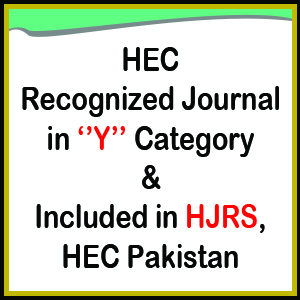Youth Knowledge, Attitude and Practices about Malaria in District Layyah Punjab
DOI:
https://doi.org/10.26710/reads.v3i2.171Keywords:
Youth, Knowledge, Practice, Malaria, LayyahAbstract
Purpose: The present study is undertaken to examine youth knowledge, attitude and practices about malaria in district Layyah Punjab. There is little evidence that studies have been conducted to evaluate knowledge, attitudes and practices of youth about malaria prevention. Thus the aim of the study is to explore the knowledge, attitude and practice of community youth about malaria prevention and management. A standardized structured questionnaire with Multiple Choice Questions was developed. Respondents was selected through simple random sample and questionnaire were used for data collection Thereafter the data were coded and entered in computer for analysis with SPSS and later for interpretation. The majority of respondents who participated in this study had positive attitude and with sufficient knowledge with low practices regarding malaria control and prevention. The findings of the study indicate that if people are supplied with accurate knowledge through appropriate channels, they may eventually have good practices in malaria prevention and management. Regular training on malaria prevention and management is necessary to address the knowledge gap revealed in the study.
References
Census Organization GOP. Population Clock. Islamabad; 2014 updated 2014; cited 2014 Sep 4; Available from:Chuma J, Gilson L, Molyneux C: Treatment-seeking behaviour, costburdens and coping strategies among rural and urban households in
Coastal Kenya: an equity analysis. Trop Med IntHealth (2007), 12:673-86.Consolidated Malaria Reports, 2010, 2011, 2012.2013 In: Ch DTI, editorLayyah: EDO (H) office; 2014.
Gallup FL, Sachs J: The economic burden of malaria. Am J Trop Med Hyg2001, 64:85-96.
Health Department GOP. Punjab Health Profile. Lahore: Health Department, Government of Punjab; 2014 updated 2014 29 Aug ; cited 2014 Sep 04
Hlongwana, K. W., Mabaso, M. L., Kunene, S., Govender, D., &Maharaj, R. (2009). Community knowledge, attitudes and practices (KAP) on Malaria in Swaziland: A country earmarked for Malaria elimination. Malaria Journal, 8
Mazigo, H. D., Obasy, E., Mauka, W., Manyiri, P., Zinga, M., Kweka, E. J., et al. (2010). Knowledge, Attitudes, and Practices about Malaria and Its Control in Rural Northwest Tanzania. Malaria Research and Treatment, 1-9.
MDG (2008) UN Millennium Development Goals. New York: United Nations. Available :http://www.un.org/millenniumgoals/.
Jones G, Steketee RW, Black RE, Bhutta ZA, Morris SS, Bellagio Child Survival Study Group: How many 15 child deaths can we prevent this year? Lancet 2003, 362:65-71.
WHO. Country Cooperation Strategy at a glance; 2011 2011 May Contract No.: Document Number.
WHO. 10 facts on malaria. WHO; 2014 [updated 2014; cited 2014 sep 04 ]; Available from http://www.who.int/features/factfiles/malaria/en/index.html.
WHO Roll Back Malaria Eastern Mediterranean Region. Cairo, Egypt.2002-1-14
World HealthOrganization: strategic plan for malaria control and elimination in the whoeastern Mediterranean region 2006-20
World Health Organizations: The African Summit on Roll Back Malaria,Abuja, April 25, 2000 Geneva, Switzerland, World Health Organization Roll Back Malaria; 2000
WHO. World Malaria Report 2011. Geneva: WHO; 2011Contract No.: Document Number.









